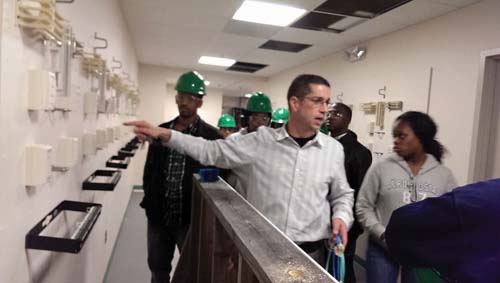November 14, 2013
 Building Pathways: Students learn about fiber optics from instructor Tom Olson at IBEW Local 103. Photo by Gintautas Dumcius
Building Pathways: Students learn about fiber optics from instructor Tom Olson at IBEW Local 103. Photo by Gintautas Dumcius
Tom Olson holds up a pale blue cord in front of the class. Outlets and wires hang from the ceiling over the heads of 15 men and women, many of whom are wearing green hard-hats. “FiOS,” Olson says, holding the blue cord a little higher. “Anybody know what that stands for?”
The answer comes cautiously, in unison, from the class: “Fiber integrated optical solutions.” Says Olson, “Now, when you see the commercials with Comcast and FiOS and Verizon, you’ll be able to say ‘I know what FiOS is.’ Fiber integrated optical solutions, right? High-end communications, guys and girls. It doesn’t get any faster than that. That’s transmission through glass.”
Olson, a 46-year-old Medford resident, has spent 28 years in the telecommunications business, working with fiber optics, copper, and security systems. And on this chilly Thursday in October, he is inside a training center in Dorchester across from the International Brotherhood of Electrical Workers (IBEW) Local 103 Hall talking about the technology that surrounds him and his students for the day.
The students, all people of color from Boston, most of them women, are in the middle of a six-week program, learning construction math and labor history, and getting introduced to roofing, masonry, and other trades. On this day, they had physical training at 7 a.m., before departing for IBEW Local 103, touring, breaking for lunch and then sitting for a talk with officials from state attorney general’s office and the Massachusetts Commission Against Discrimination.
Today, they will graduate from the program and, their instructors and program backers hope, join the building trades, which are dominated by white men.
The pre-apprenticeship program, known as “Building Pathways,” became the focus of television ads and a mayoral candidate’s biography during the race to replace Mayor Thomas Menino. State Rep. Marty Walsh, a Dorchester union leader who last week won that race, helped set up the program, which is run by the Construction Institute, a partnership between contractors and the building trades. The program itself is small – there have been 54 graduates since 2011 and four training “cycles.”
“The goal of the program is to make sure they’re exposed to as many trades as possible so they can make an educated decision about which trade they want to pursue,” said Mary Vogel, executive director of the Construction Institute and a former labor lawyer.
Depending on the facility they’re in on a certain day, the students get hands-on training, learn how to read blueprints, and pursue financial literacy. At the end of the program, the Construction Institute places them in apprenticeship programs, meeting with training directors and possible employers. “Most importantly, the majority of our placements have been in mechanical or licensed trades, which have more underrepresentation among minorities and women,” Vogel said.
Janet Jones, the head of the Dorchester Roxbury Labor Committee, which keeps a close eye on the number of people of color working at local construction sites, praised the program while noting the small number of graduates. “Since we’re a ‘majority minority city’ now, there has to be more,” she said. “There have to be more folks going through a program like this. We have to speed this up.” The program is a “golden opportunity for the right person,” she added. “And it’s not enough, it’s not nearly enough.”
According to Vogel, the small classes are intentional. “We want to make sure they get real attention from our instructors,” she said. “We want to make sure that on a day-to- day basis, if they need extra help, our instructors are able to do that.”
They would like to do more, she said, but funding is limited. The program has received support from the Boston Housing Authority, Action for Boston Community Development, the Boston Building Trades Council, the US Department of Labor, and BNY Mellon. The institute has a yearly budget of $250,000, which pays for a project coordinator, case management, training materials, supplies, some transportation and childcare vouchers.
At the IBEW training center, 32-year-old Yasmani Santiago takes a break from the classes. Doug Whalen, a Savin Hill resident who has a degree in electrical engineering and whose wife is a union plumber, was showing Santiago and his classmates the various types of fire alarms and how they worked.
“They start with simple things and they help you build on a daily basis,” Santiago said of the program. “It helps with your self esteem. They prep you for what’s to come. They’re helping the community, the inner city.”
Topics:


